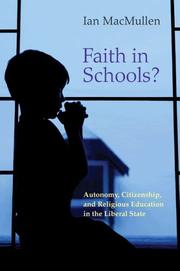| Listing 1 - 2 of 2 |
Sort by
|
Book
ISBN: 0191797995 9780191797996 9780191053337 0191053333 9780198733614 0198733615 Year: 2015 Publisher: Oxford : Oxford University Press,
Abstract | Keywords | Export | Availability | Bookmark
 Loading...
Loading...Choose an application
- Reference Manager
- EndNote
- RefWorks (Direct export to RefWorks)
The goal of this book is to show how we can recognise the value of the kinds of character formation that civic education has traditionally involved without losing the portion of the truth that can be found in the orthodox view that favours critical autonomy. 'Civics Beyond Critics' warns against neglecting character traits that, although commonly labelled 'conservative', are realistically essential for the future of all liberal democracies.
Education --- Education and state --- Civics --- Character --- Social Sciences --- Education, Special Topics --- Political aspects --- Study and teaching --- Ethology --- Ethics --- Personality --- Education policy --- Educational policy --- State and education --- Social policy --- Endowment of research --- Politics and education --- Government policy --- Civics - Study and teaching --- Education - Political aspects

ISBN: 9781400828111 1400828112 1282087010 9781282087019 9780691130910 0691130914 9786612935503 6612935502 9786612087011 6612087013 128293550X Year: 2007 Publisher: Princeton, N.J. Princeton University Press
Abstract | Keywords | Export | Availability | Bookmark
 Loading...
Loading...Choose an application
- Reference Manager
- EndNote
- RefWorks (Direct export to RefWorks)
Should a liberal democratic state permit religious schools? Should it fund them? What principles should govern these decisions in a society marked by religious and cultural pluralism? In Faith in Schools?, Ian MacMullen tackles these important questions through both political and educational theory, and he reaches some surprising and provocative conclusions. MacMullen argues that parents' desires to educate their children "in the faith" must not be allowed to deny children the opportunity for ongoing rational reflection about their values. Government should safeguard children's interests in developing as autonomous persons as well as society's interest in the education of an emerging generation of citizens. But, he writes, liberal theory does not support a strict separation of church and state in education policy. MacMullen proposes criteria to distinguish religious schools that satisfy legitimate public interests from those that do not. And he argues forcefully that governments should fund every type of school that they permit, rather than favoring upper-income parents by allowing them to buy their way out of the requirements deemed suitable for children educated at public expense. Drawing on psychological research, he proposes public funding of a broad range of religious primary schools, because they can help lay the foundations for young children's future autonomy. In secondary education, by contrast, even private religious schools ought to be obliged to provide robust exposure to the ideas of other religions, to atheism, and to nonreligious approaches to ethics.
LEGITIMATE PUBLIC INTEREST -- 322 --- USA -- 322 --- SEPARATION OF CHURCH AND STATE -- 322 --- Education and state --- Church and education --- Church schools --- Education --- Education policy --- Educational policy --- State and education --- Social policy --- Endowment of research --- Education and church --- Christian schools --- Denominational schools --- Diocesan schools --- Faith-based schools (Church schools) --- Parish schools --- Parochial schools --- Schools, Denominational --- Schools, Parochial --- Private schools --- Philosophy. --- Government policy. --- Government policy --- Philosophy --- Church schools - Government policy --- Church and education - Philosophy --- Education and state - Philosophy
| Listing 1 - 2 of 2 |
Sort by
|

 Search
Search Feedback
Feedback About
About Help
Help News
News